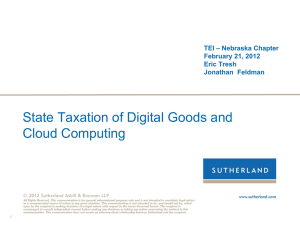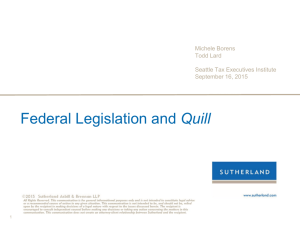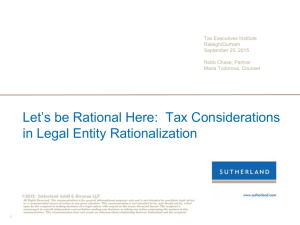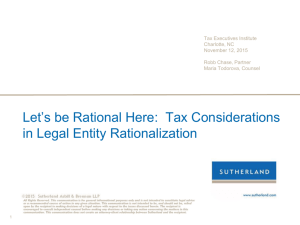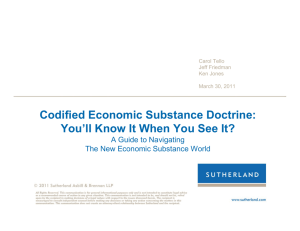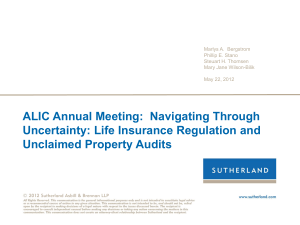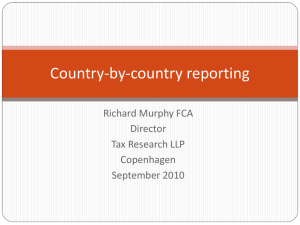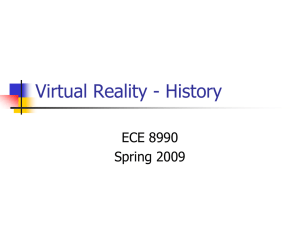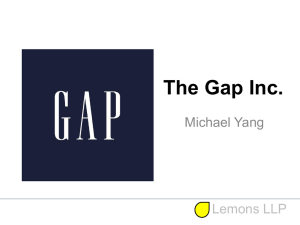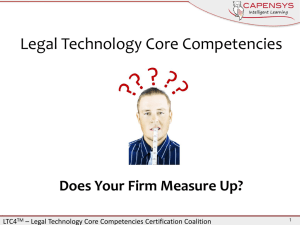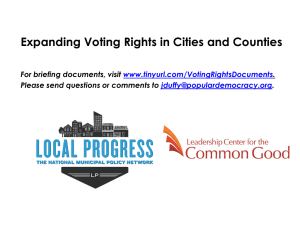If You Have to Ask, It`s Too Late! (Cont`d)
advertisement
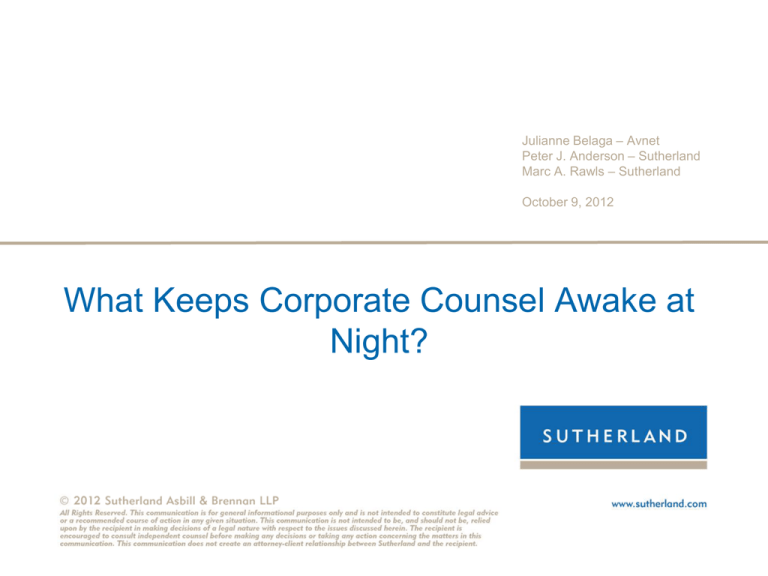
Julianne Belaga – Avnet Peter J. Anderson – Sutherland Marc A. Rawls – Sutherland October 9, 2012 What Keeps Corporate Counsel Awake at Night? Agenda • The Office of General Counsel Is Not a Profit Center: Wrong • FCPA: Best Practices to Maintain Regulatory Compliance • Is Someone Whistling While You Work? Whistleblower Procedures Post Dodd-Frank • General Counsel Do Advise Directors and Officers ©2012 Sutherland Asbill & Brennan LLP The Office of General Counsel Is Not a Profit Center: Wrong ©2012 Sutherland Asbill & Brennan LLP Order of Priorities/Objectives for a Client to Understand in Any Governmental Investigation, Civil or Criminal • Keep your freedom, i.e., stay out of jail at all costs • Keep from getting “charged” in the first place, avoid becoming a defendant, civil or criminal • Keep one’s job • Keep your accumulated wealth • Keep your head held high ©2012 Sutherland Asbill & Brennan LLP Who Pays for the Defense When and If There Is an Investigation and/or Prosecution? • Indemnification/Advancement Delaware law is broad Check your corporate bylaws now, especially if not a Delaware corporation Undertakings by corporate officers, directors to trigger advancement Acted in good faith No self interest No fraud ©2012 Sutherland Asbill & Brennan LLP Who Pays for the Defense When and If There Is an Investigation and/or Prosecution? (Cont’d) • D&O, E&O Insurance Coverage As a corporate counsel, send notice early, even if no asserted claim as defined by the Policy Subpoenas Formal Orders from Securities and Exchange Commission which mention the Company, its officers and/or directors Wells Notices Litigation Demands Regulatory exception which appears in many D&O policies Consider “paying up” if protection is available Insurance does not cover penalties ©2012 Sutherland Asbill & Brennan LLP What Do We Do When Stuff Has Hit the Fan? If You Have to Ask, It’s Too Late! • • • • • Litigation Regulatory Possible accounting fraud Insider trading FCPA ©2012 Sutherland Asbill & Brennan LLP What Do We Do When Stuff Has Hit the Fan? If You Have to Ask, It’s Too Late! (Cont’d) • Two levels of preparation are necessary to successfully weather a crisis Crisis prevention Controls Information flow has implications for insider trading Tone of compliance by management Communicating a true commitment to compliance with policies, procedures, and training, and establishing ways for employees to report issues and concerns (e.g., through an employee hotline) can help prevent a crisis Preplanning and the exercise of sound judgment are critical Consistent discipline Training Due Diligence ©2012 Sutherland Asbill & Brennan LLP What Do We Do When Stuff Has Hit the Fan? If You Have to Ask, It’s Too Late! (Cont’d) • Two levels of preparation are necessary to successfully weather a crisis (Cont’d) Crisis response What role will general counsel/general counsel’s team play? When is outside counsel brought in? Counsel to the Special Committee Who is “calling the shots”? Usually not in-house counsel, but there are important roles to play ©2012 Sutherland Asbill & Brennan LLP What Do We Do When Stuff Has Hit the Fan? If You Have to Ask, It’s Too Late! (Cont’d) • “Lawyering Up” Who needs to know internally when a problem first surfaces? Internal investigations are usually external Loss of privilege for corporate officers – “what do you mean you are not my lawyer?” Conflicts Even mid-level employees should have counsel Litigation hold How broad? Who gets? What should it say? ©2012 Sutherland Asbill & Brennan LLP What Do We Do When Stuff Has Hit the Fan? If You Have to Ask, It’s Too Late! (Cont’d) • There is still a business to run: Are we concerned about a whistle blower? Is the matter public? Saying less is more Don’t p… off government Anything you say will be used against you You don’t know what you don’t know How much time do we have before we need to disclose To the government? To the investing public? Get the basic facts quickly Identify the usual suspects ©2012 Sutherland Asbill & Brennan LLP FCPA: Best Practices to Maintain Regulatory Compliance ©2012 Sutherland Asbill & Brennan LLP Where is the Corruption? Source: Transparency International’s Corruption Perception Index 13 ©2012 Sutherland Asbill & Brennan LLP FCPA vs. U.K. Bribery Act FCPA (Effective 1977) 1. 2. Covers issuers, U.S. “domestic concerns” and agents Focuses on bribes of foreign officials (“FO”) • • 3. 4. 5. 6. 14 Making a payment to a person defendant knew or believed to be a FO Or where defendant knew all or portion of money would be offered, given, or promised directly or indirectly to a FO U.K. Bribery Act (Effective July 2011) 1. 2. 3. 4. 5. 6. Covers private citizens and companies which “carry on business” in the U.K. Bribes don’t have to be of foreign or government officials Established a “Prevention Offense” which is strict liability No exception for facilitation payments Defense to Prevention Offense is having appropriate procedures Recipients of bribes can be charged Books and records violations are independent basis of liability Allows “facilitation payments” No strict liability Recipients of bribes are not covered ©2012 Sutherland Asbill & Brennan LLP What About Foreign Payment Keeps You Up At Night? • • • • 15 Use of third-party providers New acquisitions or contracts Facilitation payments Understanding who is a foreign official ©2012 Sutherland Asbill & Brennan LLP What About Foreign Payment Keeps You Up At Night? (Cont’d) • Travel and entertainment 16 1. Product demonstration 2. Excessive travel and entertainment to government officials 3. Inaccurate accounting of travel and entertainment to government officials 4. Pretextual reason for product demonstration 5. Meals and entertainment provided in connection with routine business activity (i.e., product demonstration, training, sales meetings) rise to a violation of the FCPA. 6. Certain gratuities are ‘de minimis’ 7. An approval process for expenses ©2012 Sutherland Asbill & Brennan LLP What About Gratuities Keeps You Up At Night? • Gifts Gift giving pursuant to local customs or holidays Not to offend business partners Given as cultural display of respect and good will 17 ©2012 Sutherland Asbill & Brennan LLP Third Parties How to Rein in Rogue Third-Party Providers • Communicate existence of company’s anti-bribery policy • Write in contracts: “We expect you to comply with FCPA.” • Demand reciprocal compliance • Require annual certification of compliance • Insist on monetary clawbacks if violations discovered as condition of contract • Report third parties’ violations 18 ©2012 Sutherland Asbill & Brennan LLP Contracts and Acquisitions • Acquisition due diligence 1. Inadequate due diligence and failing to respond to red flags may give rise to violations 2. There is great fear that companies will be held liable for the pre-acquisition conduct of acquired companies • • • • 19 Create customized due diligence questionnaires Conduct thorough document review Interview key personnel in various departments Consider self-reporting if irregularities are found ©2012 Sutherland Asbill & Brennan LLP Should We Waive the Privilege? • No waiver of privilege just the facts Expects a company to provide the basic facts that the government needs to learn, while also allowing the company to protect its own work product and privileged communications 20 ©2012 Sutherland Asbill & Brennan LLP FCPA Best Practices • Identify high-risk countries and high-risk business activities • Increase monitoring of all payments across the supply chain • Conduct annual compliance policy review and updates • Draft policies governing facilitation payments • Expand application of internal policies to outside vendors and agents • Appoint a senior corporate executive to oversee compliance policy who directly reports to a board committee 21 ©2012 Sutherland Asbill & Brennan LLP The U.K. Guidance on Bribery Act of 2011 Best Practices for Prevention • • • • • • • • 22 International businesses struggle with their responsibilities to monitor and control the conduct of third parties with whom they do business: distributors and sub-distributors, joint venture partners, dealers, and resellers Senior management’s commitment to culture of compliance Rigorous and appropriate procedures Annual risk assessments Due diligence on acquisitions and new business endeavors Communication and training to employees and third-party providers Monitoring and external validation Reports to board of directors ©2012 Sutherland Asbill & Brennan LLP What If We Keep Quiet? • Cooperation and self reporting There is no discernible difference in the outcome of fines and penalties for companies that have self-reported potential FCPA violations versus situations where the government identified potential problems on its own. 23 ©2012 Sutherland Asbill & Brennan LLP Is Someone Whistling While You Work? Whistleblower Procedures Post Dodd-Frank ©2012 Sutherland Asbill & Brennan LLP Whistling Can Be Profitable • • • • • SEC’s final rules effective August 12, 2011 (Regulation 21F) (“we have already seen an increase in the quality of tips” Sean McKessy, 8/11/11) Provide for 10% to 30% of aggregate recovery from related actions that exceed $ 1 million (penalties, disgorgement, interest) (Rule 21-F3; 21F-4) To persons who voluntarily provide original information to the SEC about possible securities laws violations If that information substantially contributes to successful enforcement action (Rule 21F-3) As of October 2010, SEC had $451 in fund for paying awards ©2012 Sutherland Asbill & Brennan LLP Who Can Whistle? • Any individual (employee, agent or someone outside the company such as independent contractors, consultants, suppliers) (Rule 21F-2) As long as it is about a possible federal securities law violation that has occurred, is ongoing, or is about to occur (Rule Can be anonymous (through counsel) • Some exceptions Corporations or other entities (Rule 21F-2) ©2012 Sutherland Asbill & Brennan LLP Who Can’t Whistle • • • • • • • SEC, DOJ, PCAOB, SRO staff, foreign government officials, persons convicted of related criminal violations, people who lie in their whistleblower submissions (Rule 21F-8(c)); Attorneys or others with privileged information or information obtained through representation of a client (information not independent-Rule 21F-4(b)(4)(i), (ii)); Officers, directors, trustees or partners of an entity if informed by others or the information was learned during the process of addressing possible violations (same-Rule 21F-4(b)(4)(iii)(A)); By an employees with principally compliance or internal audit responsibilities (including third parties) (same-Rule 21F-4(b)(4)(iii)(B)); Those employed by or associated with a firm retained to conduct an inquiry or investigation into possible violations of law (Rule 21F4(b)(4)(iii)(C); Audit firm employees if information was obtained in connection with audit required under the federal securities laws (Rule 21F4(b)(4)(iii)(D)); Those who obtain information in a manner determined by a federal court to violate federal or state criminal law. ©2012 Sutherland Asbill & Brennan LLP Exceptions • Can swallow the rule: Certain persons can report directly to SEC if: They have a reasonable basis to believe that disclosure is “necessary to prevent the relevant entity from engaging in conduct that is likely to cause substantial injury to the financial interest or property of the entity or investors” (Rule 21F-4(b)(4)(v)(A)); Waited 120 days after reporting the information internally to entity’s audit committee, CLO, CCO, unless they already knew, or to supervisor. (Rule 21F-4(b)(4)(v)(c) For attorneys, disclosure must be consistent with ethical obligations (attorneys for issuers can make disclosures under SOX under certain circumstances) ©2012 Sutherland Asbill & Brennan LLP What’s the tune? • • • • Provision of information must be voluntary, i.e., prior to personally (or through counsel) receiving request directed to the whistleblower from SEC or others (e.g., PCAOB, SRO, Congress, state AG or securities authority, other federal agency) or having duty to report (may be aware of investigation or inquiry or internal review)(Rule 21F-4(a)) But can consider submission voluntary if gave information to other of the organizations before got a request from the SEC (Rule 21F-4(a)(2); (b)(7)) Not voluntary if have contractual or legal duty to report (Rule 21F-4(a)(3)) May induce whistleblowers to report quickly ©2012 Sutherland Asbill & Brennan LLP You Know How to Whistle, Don’t You? • Information must also be original (Rule 21F-2) Derived from whistleblower’s independent knowledge or independent analysis; Is not already known to the SEC; Doesn’t come from public information (unless the whistleblower is the source or analyzes the information to reveal information not otherwise known to the public) Provided to the SEC after July 21, 2010 (Rule 21F-4(b)) • Nothing in the rule explicitly discourages employees from absconding with corporate information ©2012 Sutherland Asbill & Brennan LLP Beauty Is In the Eye of the Beholder… • What’s information that leads to a “successful” enforcement action? Must be sufficiently specific, credible and timely to cause staff to open, or reopen an investigation, conduct an examination or inquire about different conduct (Rule 21F-4(c)(1)) Subsequent action based in whole or part on the information; or Information significantly contributes to success of pending action. ©2012 Sutherland Asbill & Brennan LLP Will Whistleblowers Report Internally? • Placeholder and credit provisions Rules allow for employee to report information internally and preserve ‘place in line’ if reports to the SEC within 120 days (look back) Credited with information company develops if first or simultaneously reports internally and within 120 days reports to SEC (Rule (21F-4(c)(3)) Idea-facilitate internal compliance ©2012 Sutherland Asbill & Brennan LLP Clean as a Whistle? • Amounts awarded are discretionary with Commission 10-30% penalties, disgorgement, interest, money deposited in disgorgement fund, etc. Enhancing Factors (Rule 21F-6) Whether the whistleblower used internal compliance processes Significance of information provided Degree of assistance provided Timeliness of report, cooperation Programmatic interest of SEC, conservation resources Unique hardships suffered by whistleblower as result reports and assistance Diminishing Factors Interference with internal compliance policies Culpability or involvement in matter at issue (whistleblowing does not convey amnesty) (Rule 21F-15; 21F-16) Financial benefit to whistleblower Unreasonable delay (e.g., only after learned of Investigation) ©2012 Sutherland Asbill & Brennan LLP If a Tree Falls…. • Companies might not be informed of whistleblower allegations-discretionary with SEC • Rules provide for SEC staff to communicate directly with directors, officers, members, agents and employees of entities who have initiated communication regarding a possible securities law violation even if the entity is represented by counsel (Rule 21F-17(b)) ©2012 Sutherland Asbill & Brennan LLP What to Do When You Hear Whistling? • Anti-retaliation provisions Sec. 922 of Dodd-Frank: no discharging, demoting, suspending, threatening, harassing, discriminating, directly or indirectly Private right of action (district court) for those who reasonably believe a violation has or will occur or is ongoing; compensation if successful Apply to all whistleblowers, not just successful ones (Rule 21F2(b)(ii)) Can’t require arbitration of whistleblower retaliation dispute Subjective and objective elements to test Can’t use confidentiality agreements to prevent people from communicating with SEC (Rule 21F-17) Rules give the SEC enforcement authority with respect to retaliation (Rule 21F-2(b)(2)) ©2012 Sutherland Asbill & Brennan LLP Whistleblower Procedures • Report via Form TCR (tip, complaint, referral) Must be submitted under penalty perjury May be anonymous; then attorney must keep form • Notice of covered action published for matters with over $1 million in sanctions Whistleblowers have 90 days to submit form WB-APP Staff’s preliminary determination becomes final in 60 days Procedure for contesting whether and to whom to make award • Award mandatory if meet criteria; amount discretionary (Rule 21F-5) ©2012 Sutherland Asbill & Brennan LLP Take-Aways • Best internal compliance programs Make sure employees have an avenue for expressing concerns and that concerns are appropriately elevated and addressed Try to help employees be comfortable with making internal reports Devote adequate internal resources to evaluating complaints, tips and whistleblower reports Encourage third-party service providers to report internally When conducting a review, especially one using third parties, consider whether that review should be done under counsel’s direction ©2012 Sutherland Asbill & Brennan LLP General Counsel Do Advise Directors and Officers ©2012 Sutherland Asbill & Brennan LLP General Counsel Do Advise Directors on Their Duties • • Lawyers do a better job of advising directors about fiduciary duties than advising officers because it is usually more clear cut and outside counsel usually weigh in Current decisional law in Delaware is clear that, for directors at least, the duty of “care in the decision-making context is process due care only,” i.e., so long as you are not making decisions by throwing darts at a board, even if the decision proves to turn out poorly, can’t be criticized Gross negligence standards for directors have been interpreted as reckless indifference/ “blind eye” • The duty of loyalty for directors is quite close to the duty of loyalty owed by agents The duty of loyalty in corporate law takes director conflicts quite seriously ©2012 Sutherland Asbill & Brennan LLP Officers/Directors Wearing Different Hats in Corporations Are a Corporate Counsel’s Headache • Recent focus of SEC investigations • Not a conflict of interest where both officer and director of same entity Issue arises when positions are held in distinct corporate entities • Different standards of care/liability For directors, gross negligence, i.e., turning a blind eye For officers, breach of ordinary care in similar circumstances • Two “Masters” conundrum: Duty to keep material information confidential Duty to put client’s interest first resulting in a duty to disclose ©2012 Sutherland Asbill & Brennan LLP Officers/Directors Wearing Different Hats in Corporations Are a Corporate Counsel’s Headache (Cont’d) • Multiple hats and the knowledge learned while wearing each can erode the defenses available E.g., proof of gross negligence is easier when in possession of actual knowledge Justifiable reliance on subordinates may be undermined, where one is charged with supervision activities on ‘day to day’ basis. • Can the conflict be waived? Maybe: Disclosure of actual conflict v. possible conflict Insertion of disinterested proxy (person) for one or both of roles ©2012 Sutherland Asbill & Brennan LLP How to Advise When a CEO is Thought to Have “Screwed Up” • • • Board of directors typically communicates corporate goals in a very broad manner, in such metrics as profitability, market share, and growth. What course of action utilized to achieve those goals is largely up to senior management. Discretion over substance of business decisions lies primarily with corporate officers, not the Board. There is little basis for holding an officer liable for a substantive decision that deliberately was left to him to make in the first place. Officers who follow a sensible decision-making approach when undertaking ventures that carry significant business risk which end up failing will not be sued by the corporation. But you may get fired. ©2012 Sutherland Asbill & Brennan LLP How to Advise When a CEO is Thought to Have “Screwed Up” (Cont’d) • • • Officers who get fired rarely face monetary damages for negligence by the corporation for at least three reasons: First, it is not cost efficient and a distraction for the corporation to try to detect/prevent all carelessness or wrongdoing and to pursue legal claims for all such behavior. Second, the standard is reasonable conduct. An agent is expected to act only with the care, competence, and diligence “normally exercised” by similar agents in “similar circumstances.” Third, as to the substance or merits of the business decision made, the protection of the business judgment rule is fully available to officers. Fiduciary duty claims against executives likely are “settled up” at the departure stage and therefore will not be litigated. Exit packages likely also entail the mutual release of all claims. Officer conduct damaging to the company creates a corporate derivative claim by shareholders and not a direct claim. Board of directors, not stockholders, are the appropriate body for addressing such claims. ©2012 Sutherland Asbill & Brennan LLP Questions? Julianne Belaga Vice President and Assistant General Counsel, Global Acquisitions Avnet, Inc. 404.853.8414 julianne.belaga@avnet.com Peter J. Anderson Partner Sutherland Asbill & Brennan LLP 404.853.8414 peter.anderson@sutherland.com Marc A. Rawls Partner Sutherland Asbill & Brennan LLP 404.853.8058 marc.rawls@sutherland.com 44 ©2012 Sutherland Asbill & Brennan LLP
